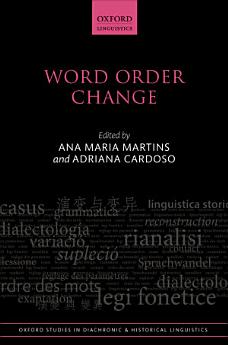Word Order Change
Ana Maria Martins · Adriana Cardoso
Jun 2018 · Oxford Studies in Diachronic and Historical Linguistics Book 29 · Oxford University Press
Ebook
336
Pages
family_home
Eligible
info
reportRatings and reviews aren’t verified Learn More
About this ebook
This volume explores word order change within the framework of diachronic generative syntax. Word order is at the core of natural language grammatical systems, linking syntax with prosody and with semantics and pragmatics. The chapters in this volume use the tools provided by the generative theory of grammar to examine the constrained ways in which historical word order variants have given way to new ones over time. Following an introduction by the editors, the book is divided into four parts that investigate changes regarding the targets for movement within the clausal functional hierarchy; changes (or stability) in the nature of the triggers for movement; verb movement into the left peripheries; and types of movement, with specific focus on word order change in Latin. Data are drawn from a wide variety of languages from different families and from both classical and modern periods, including Sanskrit, Tocharian, Italian, Portuguese, Dutch, Irish, Hungarian, and Coptic Egyptian. The book's broad coverage and combination of language-internal and comparative studies offers new perspectives on the relation between word order change and syntactic movement. The volume also provides a range of wider insights into the properties of natural language and the way in which those properties constrain language variation and change.
About the author
Ana Maria Martins is Professor at the School of Arts and Humanities at the University of Lisbon. Her research in comparative syntax and historical syntax covers topics such as word order, clitics, negation, emphatic polarity, infinitival structures, and passive and impersonal constructions. She has directed projects resulting in parsed corpora for the study of the syntax of European Portuguese dialects (CORDIAL-SIN) and the syntax of Old Portuguese (WOChWEL). She has published articles in journals such as Lingua, Natural Language and Linguistic Theory, and Linguistic Inquiry, and is the editor of Manual de Linguística Portuguesa (De Gruyter, 2016) and co-editor of the journal Estudos de Lingüística Galega. Adriana Cardoso is Assistant Professor at the Higher Education College of Lisbon (ESELx) and researcher at the Linguistics Centre of the University of Lisbon (CLUL). Her main research interests are historical linguistics, comparative syntax, and educational linguistics. She was recently involved in the WOChWEL project (Word Order and Word Order Change in Western European Languages), sponsored by the Portuguese National Science Agency. Her book Portuguese Relative Clauses in Synchrony and Diachrony was published in 2017 by OUP.
Rate this ebook
Tell us what you think.
Reading information
Smartphones and tablets
Install the Google Play Books app for Android and iPad/iPhone. It syncs automatically with your account and allows you to read online or offline wherever you are.
Laptops and computers
You can listen to audiobooks purchased on Google Play using your computer's web browser.
eReaders and other devices
To read on e-ink devices like Kobo eReaders, you'll need to download a file and transfer it to your device. Follow the detailed Help Center instructions to transfer the files to supported eReaders.








